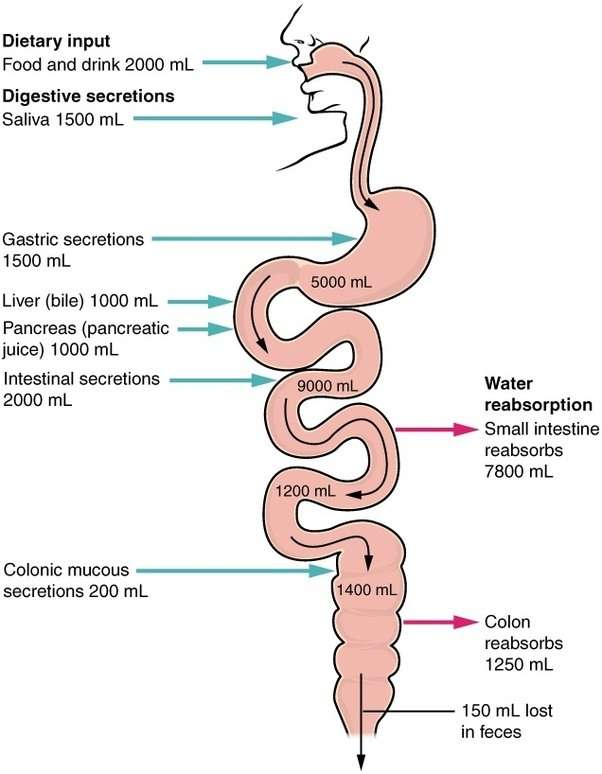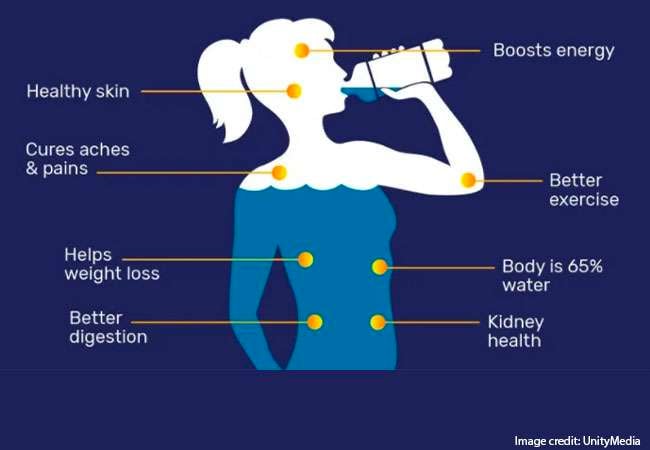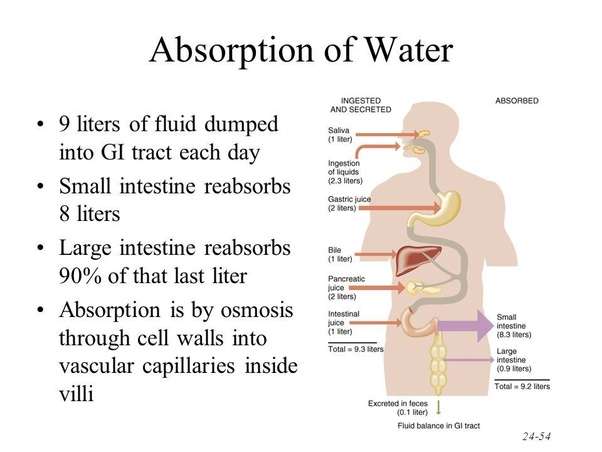What Do The Kidneys Do
Kidneys have many jobs, from filtering blood and making pee to keeping bones healthy and making a hormone that controls the production of red blood cells.
The kidneys also help regulate blood pressure, the level of salts in the blood, and the acid-base balance of the blood. All these jobs make the kidneys essential to keeping the body working as it should.
Does The Us Drink Enough Water
A study carried out by the Centers for Disease Control and Prevention in 2013 analyzed data from the National Cancer Institute’s 2007 Food Attitudes and Behaviors Survey.
Out of a sample of 3,397 adults, the researchers found the following:
7 percent of adults reported no daily consumption of drinking water 36 percent of adults reported drinking 1-3 cups of drinking water a day 35 percent of adults reported drinking 4-7 cups of drinking water a day 22 percent of adults reported drinking 8 cups or more a day
People were more likely to drink less than 4 cups of drinking water daily if they consumed 1 cup or less of fruits or vegetables a day.The study only measured the intake of drinking water and, of course, fluid can be gained from other beverages.
However, water is the ideal source of fluid because it is calorie-free, caffeine-free, and alcohol-free.Because 7 percent of respondents reported drinking no water at all daily, and those who drank a low volume of water also consumed less fruit and vegetables, it suggests that there is a certain number of people who are risking their health by not getting enough fluid.
Even if the respondents reporting low levels of water intake were obtaining enough fluid, it is likely that they would be obtaining it from sources that could potentially compromise their health in other ways.
Why Do We Need To Drink Water
The Institute of Medicine recommends that men achieve a daily fluid intake of around 3 liters and that women take in 2.2 liters.
To function properly, all the cells and organs of the body need water. It is also used to lubricate the joints, protect the spinal cord and other sensitive tissues, regulate body temperature, and assist the passage of food through the intestines.
Although some of the water required by the body is obtained through foods with a high water content – soups, tomatoes, oranges – the majority is gained through drinking water and other beverages.
During every day functioning, water is lost by the body, and this needs to be replaced. It is noticeable that we lose water through activities such as sweating and urination, but water is even lost when breathing.
Drinking water, be it from the tap or a bottle, is the best source of fluid for the body. Beverages such as milk and juices are also decent sources of fluid, but beverages containing alcohol and caffeine, such as soft drinks, coffee, and beer, are not ideal because they often contain empty calories.
It was previously thought that caffeinated beverages had diuretic properties, meaning that they cause the body to release water. However, studies show that fluid loss because of caffeinated drinks is minimal.
Recommended Reading: How To Diagnose Kidney Infection
Hydration For Kidney Health
Drink up – why hydration is important for kidney health.
Drinking sufficient levels of fluid on a daily basis is an important part of kidney health. And its not just something we should be thinking about during the warmer summer months.
We are at the greatest risk of dehydration when we are too hot or too dry, have limited access to water or lose more water than usual. Warm or dry environments, such as centrally-heated homes, tend to increase our need for fluid. We can lose more fluid through sweating , or through bouts of vomiting and diarrhoea.
The colour of our urine can be a clear indicator of whether were taking in enough fluids. We should aim to produce urine thats straw coloured or paler but, if its any darker than this, it may suggest that we are dehydrated.
Dehydration, especially chronic dehydration, results in the production of urine which has a higher concentration of minerals and waste products. This can lead to the formation of crystals which can affect kidney function and contribute to certain kidney diseases, such as kidney stones.
Research suggests that drinking plain water, in particular, can have a potentially protective effect on kidney function.
Want To Know More About Keeping Your Kidneys Happy And Healthy Get In Touch Today

Hopefully, this post has helped you to realize all the amazing things that your kidneys do for you and why its so important to keep them healthy. Staying well-hydrated is a great way to keep your kidneys well maintained and flush out the bacteria which can cause infections. However, when it comes to comprehensive kidney care, good hydration is the tip of the iceberg. Take care of your kidneys and you go a long way towards safeguarding your health for life.
Were here to make taking care of your kidneys easier.
South Texas Renal Care Group is steadfastly committed to providing you with comprehensive kidney care. By looking after your kidneys, we help you to help keep the rest of your body as healthy as possible.
If you are in need of leading-edge kidney care treatments, or simply want to know more about what you can do to look after your kidneys, contact us today at 212-8622. We cant wait to hear from you!
Don’t Miss: How Long Does It Take To Die From Kidney Failure
Other Causes Of Kidney Disease
Kidney disease is commonly caused by diabetes or high blood pressure. Drinking carbonated beverages can contribute to excess weight, which is a risk factor for developing Type 2 adult-onset diabetes, and indirectly, kidney disease. The American Kidney Fund notes that you can inherit a type of kidney disease called polycystic kidney disease. Drinking soda may increase the risk of related diseases such as diabetes consult your doctor or nutritionist about the best diet plan for you.
References
Regulation Of Renal Aquaporins
Water reabsorption along the renal tubule is generally passive to occur, but rather follows a concentration gradient created by the active reabsorption of NaCl. Therefore, a primary determinant of water reabsorption by the renal tubule is the tubules permeability. One might expect a lipid bilayer, which constitutes the outer membrane of epithelial cells lining the renal tubule, to be fairly hydrophobic, and not allow efficient water entry/exit. This is useful, for example, in the TAL, for generating the cortico-medullary osmotic gradient to allow for eventual fine-tuning of water reabsorption. However, in the PT and distal tubule , numerous intramembrane hydrophilic proteins known as water channels or aquaporins increase the porosity of the lipid bilayer allowing for H2O molecules to be reabsorbed from the luminal fluid across the apical membrane, into the cell, and then across the basolateral membrane and back into the circulation. Aquaporins , as a class, have six-membrane-spanning regions, with charged amino acids forming the actual water channel and intracellular amino and carboxy tails.
Jochen R. Hirsch, Wolf-Georg Forssmann, in, 2013
You May Like: Where Do They Put A Stent For Kidney Stones
Benefits Of Drinking Water For Healthy Kidneys
Did you know that water is essential for your kidney health? And did you know that you can actually develop kidney failure just from being dehydrated? Well, it’s true, and that’s because water is essential for kidney health. So today we’re gonna talk about it. I’m going to give you 7 benefits of drinking water for healthy kidneys and other organs.
Drinking Water Can Prevent Kidney Failure
As I mentioned, I have actually had to put patients on dialysis due to severe volume depletion or severe dehydration. What happens is that when you don’t have enough water in your system, and the kidneys feel as though they are dehydrated, you develop a condition called prerenal azotemia. If that water intake is not resolved right away, then that prerenal azotemia can progress and take you to a condition that leads to a kidney failure, that can cause you to make decreased or no urine and have other issues as well, even outright kidney failure that requires dialysis. So drinking water helps to prevent kidney failure.
Read Also: Can Kidney Problems Cause Back Pain
Helps To Maintain A Good Circulation
Drinking water helps to maintain good circulation, and so that you can deliver the proper oxygen supply to your tissues. Your blood is made up of 90% water. And what’s the purpose of blood? Well, blood has these red blood cells, which are these little donut-shaped cells, and they actually are your body’s carriers of oxygen. Yes, they’re like little cars that carry oxygen to all of your tissues. So when you have enough water in your system, then your circulation is able to flow and you have a better chance of getting all of your tissues, and your organs properly oxygenated. If you’re dehydrated, however, then you can have sluggish circulation.
What Is Reabsorption In The Kidney
Reabsorption of water and solutes is a crucial step in the renal processing of urinary filtrate. Secreted by the nephron, the glomerulotubular reabsorption system helps to control the amount of fluid that leaves the body through urine. As much as 90% of the water that is filtered into the nephron is reabsorbed before the urine leaves the body..
You May Like: Can Women Pass Kidney Stones
Drinking Water Is Key To Avoiding Painful Kidney Stones
We know it is healthy to drink water, and that many people do not drink enough. But how much does it really matter?
Just ask anyone who ever passed a kidney stone.
Kidney stones are hard chemical deposits that can form inside kidneys, the bean-shaped organs that filter waste out of the blood and turn it into urine. They rarely grow larger than a couple millimeters, but they are extremely painful as they pass through the urinary tract and out of the body.
Nearly 9 percent of Americans have had a kidney stone, according to the National Institutes for Health, and people who get them once will probably get them again. They are a common reason for emergency hospital visits.
But we can all reduce our risk by drinking more water. We need water to live, of course, and our bodies are mostly made out of it. But water also happens to be the best way to prevent kidney stones.
Our bodies naturally create waste chemicals as byproducts of digestion, breathing and other metabolic processes. Our kidneys collect that waste, mix it with water and flush it out as urine.
The less we drink, the longer those chemicals hang around. Sometimes, when they concentrate, they form tiny solids in the kidney, often made of a calcium compound or uric acid.
A few molecules stuck together will pass unnoticed. But if a body doesn’t get enough water to flush the kidneys often, that tiny solid could grow a few millimeters long.
How much water have you drunk today?
Where Does Water Reabsorption Occur In The Kidney

Water reabsorption occurs in the ascending limb of the loop of Henle. In the early portion of the ascending limb, NaCl is reabsorbed by transcellular transport at the TAL. This is counterbalanced by water reabsorption from the descending limb of the loop of Henle. In addition, water from the peritubular capillaries is reabsorbed at the connecting tubule..
You May Like: What Helps Pass A Kidney Stone Faster
Is Sparkling Water Healthy Is Hard Seltzer Healthy
Carbonated water is a healthier alternative to soda, juice or sports drinks like Gatorade. Hard seltzers tend to have fewer calories than beer. But not all carbonated water drinks are created equal. Some contain added sugars or artificial sweeteners, which can add calories, harm teeth and trigger some health conditions.
What Does Water Do For The Body
Though water isnt technically digested, its a crucial element for digestion, especially when digesting protein. Water should always be consumed with meals so that your body can properly digest and absorb the nutrients from food. Properly filtered water is ideal because it does not contain harmful chemicals and contaminants that can upset the digestive process.
The majority of waters absorption into the bloodstream occurs after water passes through the stomach and into the small intestine. The small intestine, at around 20 feet long, is the organ primarily responsible for water absorption through its walls and into the bloodstream. From here, water will travel to cells across the body, providing them with the hydration to perform daily functions efficiently.
One of the most important functions of water in the body is filtering toxins. This is primarily the job of the kidneys, but to filter toxins efficiently, kidneys require a large amount of fresh water. If the kidney does not receive enough water, it could lead to health concerns including kidney stones and other kidney-related diseases. Fortunately, one way the kidneys inform someone of whether theyre providing their body with enough water is by concentrating the amount of water expelled through urine thus changing the color of urine to bright yellow. Drinking filtered water is one of the best ways to support your kidneys because they can remove some of the toxins, reducing the strain on your body.
Don’t Miss: Are Mushrooms Good For Kidneys
How Much Water Should Drink In A Day
So here’s the magic question, exactly how much water should you drink a day? Well, there’s no one-size-fits-all answer to that question because the amount of water intake that’s right for you depends on multiple factors, including your age, your physical activity, how much you sweat, how much urine you make, how heavily or quickly you breathe. And so it really varies from person to person and you should consult your physician to find out how much water you should be drinking.
But just to give a general answer to that question, according to the United States Academies of Sciences, Engineering, and Medicine, the average man should be taking in 15.5 cups of water a day or about 3.7 liters. And the average woman should be taking in about 11.5 cups of water per day or 2.7 liters. Now, that being said, while most of your water intake will come from drinking, about 20% of your water intake comes from the foods that you eat, especially really watery foods like spinach or watermelon. So if you think about it, just in terms of drinking, then you can round that number off to about three liters a day for most people or anywhere from two to three liters. A typical water bottle is about 16 ounces. So you should be drinking on average, anywhere from 4 to 6, 16-ounce water bottles a day. But again, how much water is right for you to take in, depends on you as an individual. So be sure to consult with your physician.
Think Outside The Bottle
You May Like: Is Pomegranate Juice Good For Your Kidneys
Read Also: Can Kidney Cancer Be Detected In Urine
Are You On Dialysis
If youre on dialysis your daily fluid allowance is likely to be very restricted. Taking in too much fluid can cause problems ranging from weight gain and swelling to fluid in the lungs and heart problems.
It can help to stick to pure water and avoid caffeinated, sweetened and alcoholic drinks which require even more fluid to allow the body to properly process the toxins and chemicals they contain. Other tips can include chewing ice or enjoying frozen fruits and limiting your salt intake.
Do ask your healthcare team if its possible to adjust your dialysis solutions if you feel dehydrated during dialysis itself.
Water Waste Removed In Stools
Another exit point for water is through stools. Healthy fecal matter consists of 75% water and 25% solid matter. Once the small intestine has absorbed enough water to send throughout the body, it will pass the water along to the large intestine. When water reaches the large intestine, it will combine with solid matter to soften stool and aid digestion.
Read Also: Can Kidney Stones Cause Bloating
The Tubule Returns Needed Substances To Your Blood And Removes Wastes
A blood vessel runs alongside the tubule. As the filtered fluid moves along the tubule, the blood vessel reabsorbs almost all of the water, along with minerals and nutrients your body needs. The tubule helps remove excess acid from the blood. The remaining fluid and wastes in the tubule become urine.
Effects On Other Organs

Of course, it is not just the kidneys that are affected by a lack of water below is a small sample of the other negative consequences dehydration can bring:
Blood is more than 90 percent water, therefore, if water is in short supply, blood can become thicker and increase blood pressure.
When dehydrated, airways are restricted by the body in an effort to minimize water loss, potentially making asthma and allergies worse.
The skin can become more vulnerable to skin disorders and premature wrinkling.
The bowel needs water to function correctly. If dehydrated, digestive problems and constipation can become an issue. Dehydration can lead to an overly acidic stomach which makes heartburn more common and can encourage the development of stomach ulcers.
Cartilage, found in joints and the disks of the spine, contain around 80 percent water. If dehydration is ongoing, joints can become less good at shock absorption, which leads to joint pain.
Dehydration can affect brain structure and function. If dehydration is prolonged, cognitive ability is impaired.
Read Also: What’s The Purpose Of The Kidneys